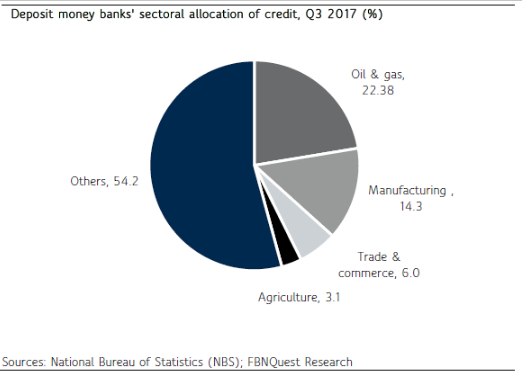Nigerian banks’ lending pattern pointing to financial exclusion of SMEs
December 20, 20172K views0 comments
A recent analysis of Nigeria’s credit allocation, based upon official data, showed that 83 percent of total lending was above N1billion, which according to FBNQuest Capital, the research arm of FBN Holdings, points towards limited financial inclusion.
Analysts at the research firm in their Good Morning Nigeria note Wednesday indicated that Nigerian banks are still adopting a “cautiously optimistic approach” on lending to avoid a surge in non-performing loans despite a relatively stable outlook for the economy.
“The impact of Nigeria’s economic downturn was severely felt in 2016. Although the outlook for the economy is now relatively stable post-recession, a cautiously optimistic approach has been adopted by banks on lending to avoid a surge in non-performing loans,” they noted, adding that the National Bureau of Statistics (NBS) released report selected banking sector data for Q3 2017, indicates credit to the private sector totaled only N15.8 trillion in Q3 2017.
Agriculture seen as number 1 sector for investment consideration in Nigeria
The credit figures equally showed that the banks favoured sector remained the oil and gas, which accounted for the largest share (22%) of DMB’s credit allocations in Q3. The second largest recipient of loans from commercial banks was manufacturing which accounted for 14 percent of the total in the same period.
Read Also:
- How to Teach Your Child About Financial Literacy
- Financial community honours Pascal Dozie's legacy at NGX tribute
- Do Impact Investors Prioritize Financial Returns Over Social Impact?
- Nigerian business leaders bet on economic growth amid inflation woes
- Economic recovery fails to ease inflation's grip on Nigerian manufacturers
However, agriculture, which has been identified as a growth engine for the economy by the FGN and the consensus of development economists, received just 3.1 percent.
“We doubt the sector will expand as quickly as it should if access to credit remains low – a major challenge for agriculturists. Although laudable, the interventions by the CBN are not sufficient,” they said.
On the other hand, they stated that lending to the real estate and construction sectors represented 5 percent and 4 percent respectively, adding that for the former, mortgage financing remains expensive in Nigeria.
The note entitled “Cautious approach to credit extension” specifically picked on the 83 percent of credit above N1 billion as promoting a limited financial inclusion as small businesses whose financial needs are often less than millions may have been crowded out in the banks’ credit allocation.
